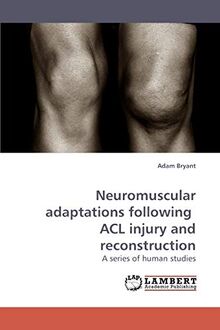
The main aim of this thesis was to identify neuromuscular variables, derived during open and closed kinetic chain tasks that relate to and predict post anterior cruciate ligament (ACL) injury/ACL reconstruction (ACLR) functional outcome. Firstly, it was necessary to assign a clinical measure of knee functionality by determining the subjective and objective limitations associated with ACL deficiency (ACLD) and ACL reconstruction (ACLR) (Experiment 1). Then, the effect of ACL deficiency and ACLR on strength deficits within the operational domain of the quadriceps and hamstrings, together with medial and lateral hamstring antagonist activity, was determined during an open kinetic chain movement (Experiment 2). An investigation into the effects of ACL deficiency and ACLR on lower limb kinematics, kinetics and neuromuscular responses during a dynamic, closed kinetic chain deceleration task followed (Experiment 3). Finally, the strength of the associations between knee functionality and adaptations displayed during open and closed kinetic chain tasks by ACLD and ACLR subjects was elucidated (Experiment 4). The fourth study was designed to address the main aim of the thesis.